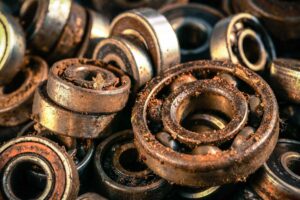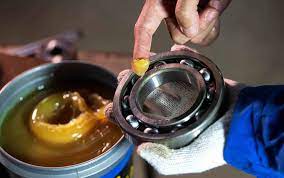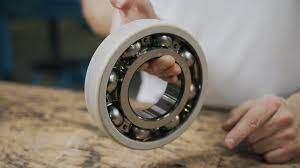Damage to motor bearings can occur when a motor is not properly cared for during storage. False brinelling and static corrosion are the two main failure modes that might emerge.
False Brinelling and Static Corrosion
- When vibration from passing equipment results in the bearing’s rolling elements vibrating against the raceway in a single location, false brinelling occurs. Over time, small bits of metal can be removed due to this vibration.
- Static corrosion occurs when the grease between the rollers and the bearing raceway is forced out. This can be caused by either vibration or the weight of the rotor shaft resting on the rollers. If the grease has little or poor corrosion inhibitors, the problem is compounded. When there is no longer grease present between the metal surfaces, galvanic corrosion occurs. Galvanic corrosion results in rust deposits on the machine’s surfaces.
 Prevention
Prevention
Avoiding the issues caused by false brinelling and static corrosion can extend the life of your motor. Prevention is as simple as ensuring the bearings are properly greased prior to being placed in storage and placing the motor on a vibration absorbing material such as wood. Routinely rotating the shaft of the motor will ensure the grease is redistributed and maintains a corrosion preventing film.

An Additional Tip
In addition to storage requirements, subjecting the motor to vibration analysis on a proper test stand can help identify damaged motor bearings. Identifying the presence of bearing damage caused by false brinelling, prior to storage, can result in cost savings and aid in extending the life of your motor.

